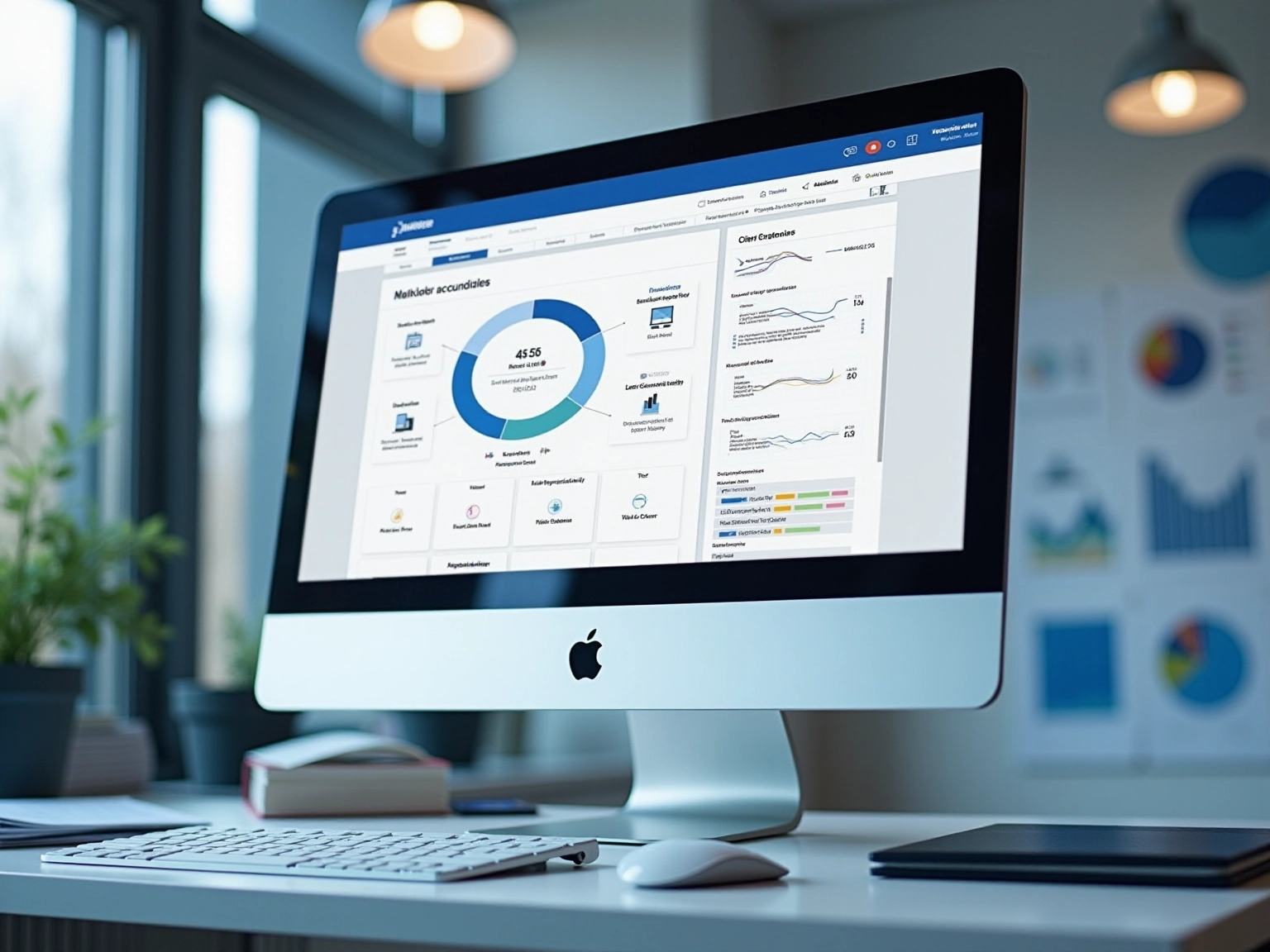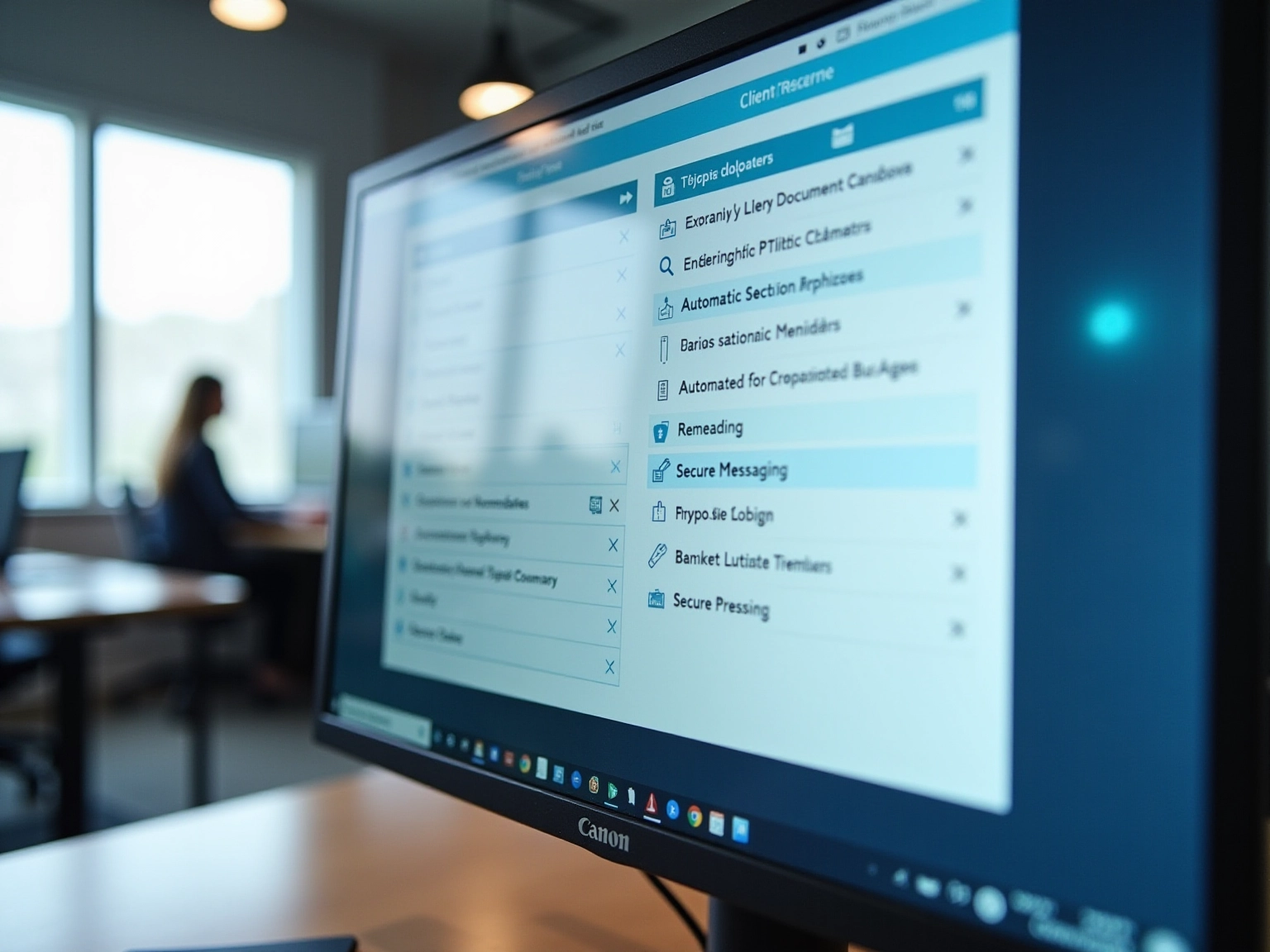Overview
The article highlights best practices for leveraging client portal apps in accounting firms, underscoring their pivotal role in enhancing communication, efficiency, and customer satisfaction. By detailing features such as real-time updates and automated reminders, it illustrates how these tools significantly improve service delivery.
Notably, firms utilising the Glasscubes platform have reported impressive metrics, including:
- A 40% increase in customer engagement
- A 50% reduction in response times
These statistics not only validate the effectiveness of client portals but also invite accounting managers to envision the transformative potential of adopting such technology.
Key Highlights:
- Client portals serve as secure online spaces that improve communication and document sharing between accountants and clients.
- Features like real-time updates and automated reminders enhance service delivery, leading to improved customer satisfaction and retention.
- Accounting firms using Glasscubes report a 40% increase in customer engagement and a 50% reduction in response times.
- User-friendly interfaces and automation are critical for enhancing operational efficiency and reducing administrative burdens.
- Client portals ensure data security and compliance with regulations like GDPR, protecting sensitive information.
- Best practices for implementing client portals include regular training, feedback mechanisms, and integration with existing tools.
- Future trends in client portals include AI integration, enhanced mobile access, and advanced data analytics for personalised customer experiences.
Introduction
In the dynamic realm of accounting, client portals have emerged as essential tools that transform the interaction between accountants and their clients. These secure online platforms not only streamline communication and document sharing but also empower firms to enhance client engagement and operational efficiency. As the demand for timely and transparent service escalates, the integration of client portals like Glasscubes is proving to be revolutionary. By reducing administrative burdens and fostering real-time updates alongside secure messaging, the benefits are both tangible and transformative.
This article explores the critical features, advantages, and future trends of client portals, illuminating how they can revolutionise accounting practices for firms striving to remain competitive in a digital-first landscape.
Understanding Client Portals: A Key Tool for Accountants
The client portal app serves as a secure online space that significantly enhances communication and document sharing between accountants and their customers. These centralised hubs enable users to effortlessly upload documents, track the status of their requests, and engage directly with their accountants. By adopting a client portal app, accounting firms can markedly elevate customer engagement and alleviate the administrative burden on their teams, allowing them to focus on delivering value-added services.
The impact of customer portals on the efficiency of accountant-customer communication is profound. With features such as real-time updates, automated reminders, and an intuitive interface, companies can ensure prompt responses—an essential component in meeting customer expectations for efficient service delivery. This not only leads to improved customer satisfaction but also fosters higher retention rates.
Indeed, organisations utilising the client portal app with Glasscubes’ user interfaces have reported a 40% increase in customer engagement rates and a 50% reduction in response times, showcasing the tangible benefits of this technology.
Expert insights underscore the importance of user interfaces in modern financial practises. A noteworthy 66% of accountants are willing to invest in AI and related technologies, with many recognising the critical role of customer interfaces in enhancing operational efficiency. As the financial software market is projected to reach $11.8 billion in the coming years, the integration of client portal apps like Glasscubes is becoming increasingly vital for firms aiming to stay competitive.
Case studies further illustrate the advantages of customer interfaces. For instance, companies that have implemented Glasscubes have experienced significant time savings, with one user reporting an impressive 288 hours saved in a single tax season. This efficiency not only cuts costs but also transforms the accounts payable and receivable processes from mundane tasks into strategic growth opportunities.
The automation of these processes is essential, as it can substantially reduce expenses and documentation while enhancing efficiency, thereby becoming a pivotal element of contemporary accounting practises. In summary, client portal apps are indispensable tools for accounting firms seeking to improve customer interaction and streamline communication. By providing a secure, encrypted, and GDPR-compliant platform that requires no extensive training, Glasscubes empowers accountants to manage customer interactions more effectively, ultimately leading to a more organised and efficient workflow.
Moreover, with 47% of consumers identifying price as a key factor in product selection, implementing customer interfaces can provide a competitive edge in the marketplace.

Benefits of Implementing a Client Portal in Your Accounting Practice
Implementing a client portal in your accounting practise can lead to numerous benefits, including:
- Increased Efficiency: Automating document requests and reminders allows accountants to significantly reduce the time spent on follow-ups. This shift enables them to focus on more strategic tasks, ultimately improving productivity across the organisation. Firms that adopted Glasscubes have experienced a 50% reduction in response times, showcasing the efficiency gains achievable through this technology.
- Enhanced Communication: User portals facilitate real-time interaction, ensuring users receive prompt updates. This streamlined communication allows customers to easily reach out with questions or concerns, fostering a more responsive relationship between accountants and their clients. A well-structured list of pending items and associated queries ensures that any issues are addressed quickly, promoting confidence in your firm while minimising time spent on communication. This structured approach also helps mitigate uncomfortable discussions around cost, as timely information sharing reduces the likelihood of misunderstandings.
- Enhanced Customer Satisfaction: Providing customers with a user-friendly platform to manage their documents and communications can significantly enhance the overall customer experience. Companies utilising customer interfaces have reported a 40% increase in customer response rates, illustrating the positive impact on customer engagement. Additionally, Sophie Montgomery from TaxAssist Accountants reported saving an impressive 288 hours in just one tax season by using Glasscubes, highlighting the tangible benefits of these tools.
- Data Security: Client interfaces establish secure settings for exchanging sensitive information, ensuring compliance with regulations such as GDPR. Glasscubes is designed to be secure, encrypted, and GDPR compliant, providing assurance for both the company and its customers. As John H. Higgins observes, “One of the main forces motivating CPA firms to adopt a portal for customers is to minimise the risk of a privacy breach linked to sending documents that include personal information, such as tax returns, financial statements, investment details, and so on.” This is particularly crucial for protecting personal data, as the risk of privacy breaches associated with traditional email communications is significantly reduced.
- Centralised Information: Storing all customer interactions and documents in one location reduces the risk of lost information. This centralisation not only enhances organisation but also improves the efficiency of information retrieval, allowing accountants to access necessary documents swiftly. The automated workflows and real-time reporting capabilities of Glasscubes further streamline information gathering, making it easier for accountants to stay on top of customer needs.
The introduction of the client portal app is not merely a trend but a tactical step toward modernising financial practises. As businesses continue to adapt to the evolving landscape of customer interaction, the advantages of these platforms will only become more evident in 2025 and beyond. Furthermore, the evolution of customer surveys in accounting firms indicates a trend toward continuous customer satisfaction assessment, reinforcing the importance of maintaining strong relationships.

Essential Features of an Effective Client Portal
A productive customer interface is essential for enhancing both customer involvement and operational efficiency. The client portal app must encompass several crucial characteristics:
- Document Management: Clients should easily upload, access, and manage their documents securely through the client portal app. This functionality not only streamlines processes but also ensures sensitive information is meticulously handled, aligning with GDPR compliance standards.
- Automated Reminders: The client portal app should automatically send reminders for document submissions and deadlines. Glasscubes provides a flexible automated reminder feature that allows for customisable scheduling and messaging, enabling users to send an unlimited number of reminders at any frequency or on specific days of the year. This significantly reduces the need for manual follow-ups, allowing accountants to focus on strategic tasks while ensuring timely responses from customers. Reports indicate that this can lead to substantial time savings, with some companies observing an impressive 288 hours saved in just one tax season.
- Real-Time Reporting: Accountants benefit from real-time updates on the status of customer requests and document submissions via the client portal app. This transparency fosters accountability and helps organisations manage their workflows more efficiently, ultimately enhancing customer satisfaction. The client portal app allows customers to see pending items and inquiries linked to their submissions, building trust in the firm and reducing response times by as much as 50%.
- Secure Messaging: A built-in messaging system within the client portal app is vital for facilitating secure communication between accountants and their clients. Glasscubes ensures confidentiality and provides a direct line for addressing questions or concerns, further enriching the customer experience. Security is paramount in customer interfaces, especially concerning GDPR compliance, highlighting the significance of this feature. Glasscubes’ secure and encrypted messaging capabilities enhance trust and compliance in communications with customers.
- User-Friendly Interface: The client portal app should feature an intuitive and easy-to-navigate interface, requiring minimal training for both users and staff. An intuitive design encourages adoption and engagement, facilitating interaction with the platform. Notably, 60% of consumers prefer using a client portal app for digital self-service tools to manage basic inquiries, underscoring the importance of this feature in meeting customer expectations.
In 2024, the value of these features cannot be overstated, as the client portal app has become indispensable for enhancing customer experience, satisfaction, and business operations. Moreover, tailored experiences through customer platforms can lead to a 49% increase in returning patrons and an 88% enhancement in customer loyalty when frustration is minimised. By integrating these crucial elements, such as Glasscubes’ automated reminders and secure file sharing, a client portal app can significantly elevate customer interaction and operational effectiveness in professional services.

Overcoming Communication Challenges with Client Portals
Client platforms present a robust solution to the communication challenges that accounting firms frequently encounter, effectively addressing key issues such as miscommunication, delayed responses, information overload, and lack of transparency. By centralising all customer interactions, portals significantly reduce the likelihood of miscommunication. This guarantees that both accountants and customers can access the same information via the client portal app, fostering clarity and alignment in their communications. As noted by Steve, an audit manager, the clarity provided by the client portal app Glasscubes allows the audit team and customers to see exactly what information is outstanding, thereby decreasing the chances of repeated requests and lost information.
The incorporation of automated reminders and real-time notifications within customer interfaces promotes prompt reactions from users, minimising workflow delays. This proactive approach enables accountants to maintain momentum in their processes and meet critical deadlines more effectively. Steve’s experience illustrates that customers have uploaded information faster than they would through email, showcasing the effectiveness of automated communication tools in enhancing response rates.
Portals for customers facilitate structured document storage, allowing users to effortlessly locate the details they require without the hassle of sifting through multiple emails. This streamlined access not only saves time but also enhances the overall customer experience. The client portal app empowers users to access Glasscubes and view their outstanding queries, thereby optimising the process and boosting satisfaction.
With the ability to monitor the status of their requests in real-time, customers gain a sense of clarity and trust in their relationship with accountants. This visibility reassures customers that their needs are being managed swiftly and efficiently. The positive feedback from customers regarding a unified secure workspace for all information and inquiries underscores the importance of transparency in customer interaction.
The impact of implementing user interfaces is significant. Firms utilising these solutions have reported an impressive 50% reduction in response times, highlighting the efficiency gains achievable. As financial practises evolve, adapting to cloud-based financial systems is essential for addressing future challenges in the sector.
A recent case study reveals that companies embracing automation and investing in upskilling their workforce not only enhance efficiency but also strengthen their competitive edge in the market. Experts must acquire new skills to leverage technology effectively, ensuring their relevance in an increasingly digital landscape.
In 2025, as financial organisations face growing complexity and the need to comply with global standards, the role of customer portals becomes even more critical. As Sage highlights, 84% of younger generations, known as ‘digital natives’, possess progressive expectations that companies in the industry must embody to attract talent. By addressing communication obstacles, these platforms, including the client portal app, enable accountants to focus on strategic decision-making rather than administrative tasks, ultimately leading to improved customer satisfaction and engagement.
Pricing and Features: Glasscubes offers various plans tailored to meet diverse requirements, including the Essential Plan at £120 monthly, the Professional Plan at £180 monthly, and the Advantage Plan at £360 monthly. Key features encompass automated reminders, real-time reporting, and fully encrypted data storage, ensuring compliance with ISO27001 and GDPR standards. By leveraging these capabilities, accounting firms can secure a competitive advantage in the market.

Best Practices for Maximising Client Portal Efficiency
To enhance the effectiveness of your customer interface, consider implementing the following best practices:
- Regular Training: Continuous education for both personnel and users is crucial to guarantee that everyone is at ease and skilled in utilising the system. This not only improves user experience but also boosts adoption rates, as research shows that effective training can greatly influence how well users interact with the platform. Glasscubes offers dedicated onboarding assistance, which can further improve user experience and facilitate smoother transitions to using the portal.
- Feedback Mechanism: Establish a robust system for users to provide feedback on their portal experience. This facilitates ongoing enhancement and showcases your dedication to customer satisfaction. Integrating feedback systems can result in increased engagement levels, as participants feel their opinions are appreciated and addressed.
- Customisation: Adapt the platform to represent your firm’s branding and meet particular customer requirements. A tailored experience boosts user satisfaction and motivates individuals to use the platform more often, ultimately resulting in better communication and efficiency. With 88% of consumers worried about personal data management, ensuring a secure and tailored interface design is vital. Moreover, the automated reminder feature in Glasscubes enables you to send an unlimited number of reminders on a straightforward schedule or with advanced options, allowing you to personalise messages for each reminder to signify urgency for upcoming deadlines, further improving engagement.
- Integration with Other Tools: Ensure that the customer interface connects smoothly with your current accounting software. This integration simplifies workflows and lowers the chances of mistakes, allowing accountants to handle customer information and requests efficiently. Significantly, 66% of accountants are prepared to invest in AI, which can enhance the capabilities of customer interfaces and improve overall efficiency.
- Monitor Usage: Regularly review platform usage analytics to identify areas for improvement. Comprehending how users engage with the platform can assist you in enhancing features and guaranteeing that users are completely utilising the available tools. This proactive method can result in a 40% rise in customer response rates, as observed in businesses that have implemented effective user interface strategies. As John H. Higgins observed, one of the main factors motivating CPA organisations to establish a customer interface is to minimise the likelihood of a privacy breach linked to sending documents that include personal details, such as tax returns and financial statements. Switching to Glasscubes can assist in addressing the shortcomings of lengthy email exchanges and misplaced information, thereby providing a more structured and effective communication method through the client portal app.
By adhering to these best practices, financial organisations can boost customer engagement, simplify communication, and ultimately enhance overall productivity in their operations.
Ensuring Security and Compliance in Client Portal Usage
To ensure security and compliance when utilising a customer portal, accounting companies must adopt best practises that not only protect client data but also enhance operational efficiency.
- Implement Strong Authentication: Multi-factor authentication (MFA) is essential for safeguarding client accounts from unauthorised access. By requiring multiple forms of verification, firms can significantly reduce the risk of breaches; studies indicate that MFA can prevent up to 99.9% of account compromise attacks.
- Data Encryption: Ensuring that all data transmitted through the gateway is encrypted is crucial. This protects sensitive information from interception during transmission. Encryption safeguards client data while aligning with GDPR compliance, which mandates stringent data protection measures.
- Routine Security Audits: Conducting regular assessments of the system’s security measures is vital for recognising and addressing vulnerabilities. These audits should evaluate both technical and procedural aspects of security, ensuring that the portal remains resilient against emerging threats.
- Compliance Training: Providing comprehensive training for staff on compliance requirements related to data protection and privacy laws, such as GDPR, is essential. This training should emphasise the importance of data handling practises and the implications of non-compliance, fostering a culture of security awareness within the firm.
- User Access Controls: Limiting access to sensitive information based on user roles minimises the risk of data breaches. Implementing strict user access controls guarantees that only authorised personnel can view or manage sensitive customer data, thereby enhancing overall security.
- Vendor Management Policy: Establishing a vendor management policy defines standards and expectations for third-party service providers, ensuring that they comply with the same security protocols as the organisation itself.
- Consider Data Breach Insurance: With the increasing prevalence of data breaches, many companies are now purchasing data breach insurance to cover potential costs associated with security incidents. This underscores the critical importance of adopting strong security protocols in the accounting sector.
By incorporating these practises, accounting companies can safeguard customer data through the client portal app and boost customer trust and involvement, ultimately leading to enhanced operational efficiency and satisfaction. Notably, firms using Glasscubes have experienced a 50% reduction in response times, and users like Sophie Montgomery of TaxAssist Accountants reported saving an impressive 288 hours in just one tax season. Furthermore, Glasscubes offers services such as payroll management and audit/account solutions, designed to streamline processes and enhance security.
Glasscubes prioritises customer engagement and data privacy through transparent cookie settings, ensuring compliance with data protection regulations while enhancing the user experience through personalised web interactions. These tangible advantages demonstrate the effectiveness of adopting a secure customer access solution.

The Future of Client Portals in the Accounting Industry
The future of customer interfaces in the accounting sector is poised for substantial transformation, driven by several key trends:
- AI Integration: The incorporation of artificial intelligence is set to revolutionise user portals by delivering tailored experiences and automating routine tasks. This evolution not only streamlines operations but also enhances customer satisfaction through a client portal app that facilitates personalised interactions addressing individual needs. Notably, 66% of accountants are prepared to invest in AI, with 55% intending to implement it within the next three years, indicating robust industry momentum toward this technology. This investment is aligned with the anticipated growth of the accounting software market, projected to reach $11.8 billion in the next eight years, underscoring the escalating importance of advanced technology in accounting practises.
- Enhanced Mobile Access: As users increasingly favour mobile solutions, future portals will prominently feature robust mobile applications. The client portal app will enable seamless access on the go, empowering customers to engage with their accountants anytime, anywhere. This enhanced mobile access is expected to bolster customer interaction and responsiveness, thereby fortifying the accountant-customer relationship.
- Enhanced Personalisation: Future user interfaces will offer greater customisation options, allowing firms to tailor the user experience to meet specific customer requirements. This flexibility will enable accountants to craft unique interfaces that resonate with their clientele, fostering deeper engagement and loyalty.
- Data Analytics: Advanced analytics capabilities will become indispensable to user portals, providing firms with valuable insights into user behaviour and preferences. By leveraging this data, accountants can deliver more focused services, enhancing the overall customer experience and driving business growth.
- Focus on User Experience: As competition intensifies, prioritising user-friendly interfaces and seamless navigation will be crucial. Ensuring that customers can easily interact with their accountants will not only elevate satisfaction but also encourage more frequent engagements. A well-constructed platform can significantly reduce the time accountants spend on follow-ups; for instance, companies utilising Glasscubes reported a 40% increase in customer response rates and a 50% decrease in response times. Furthermore, automating accounts payable can save $16 or more per invoice, illustrating the financial benefits of integrating AI into financial processes.
Conventional email communication presents challenges, including the risk of misplacing important correspondence and the lack of automated reminders for overdue or missing items. Glasscubes effectively addresses these issues by providing a secure, encrypted, and GDPR-compliant platform that ensures all communication is contained within each audit request, fostering trust in your firm and minimising the time spent retrieving information.
These trends highlight the critical role that the client portal app will play in shaping the future of accounting, emphasising the necessity for firms to adapt and innovate to meet evolving expectations. With Glasscubes’ automated communication and real-time progress tracking, accountants can overcome communication inefficiencies and enhance client engagement, ultimately transforming their practise.

Conclusion
Client portals have undeniably transformed the landscape of accounting, offering a multitude of benefits that enhance both client engagement and operational efficiency. By streamlining communication and document sharing, these platforms enable accountants to concentrate on strategic tasks rather than administrative burdens. The adoption of tools like Glasscubes has yielded impressive results, including a significant reduction in response times and an increase in client satisfaction, underscoring the tangible advantages of integrating technology into accounting practices.
As the industry continues to evolve, the significance of features such as automated reminders, secure messaging, and real-time updates cannot be overstated. These functionalities not only improve workflow but also cultivate a sense of trust and transparency between accountants and clients. Furthermore, the push towards enhanced security and compliance guarantees that sensitive data is safeguarded, thereby reinforcing the credibility of accounting firms in an increasingly digital environment.
Looking ahead, the future of client portals is promising, with emerging trends such as AI integration, mobile access, and advanced data analytics poised to revolutionise the client experience even further. Firms that embrace these innovations will not only enhance their operational capabilities but also position themselves as leaders in a competitive market. Adopting client portals is not merely a trend; it is a strategic necessity for accounting firms aiming to thrive in a digital-first landscape.
